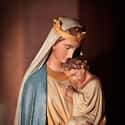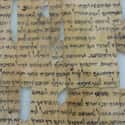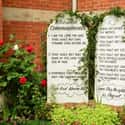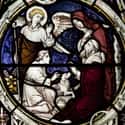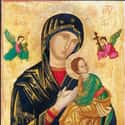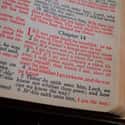-
(#1) The Gospel Of Mary Of Magdala Doesn't Fit With The Rest Of The Bible, So It Doesn't Get Included
The Gospel of Mary Magdalene is an apocryphal text that Biblical scholars really don't want to include in the Bible—not because it was written in the 2nd or 3rd century (plenty of books in the Biblical canon weren't even finished until the 2nd century), but because it offers a different take on spiritualism than the rest of the books.
In this book, Mary describes a discussion she has with Jesus and the disciples where Jesus explains that people have a spirit, a mind, and a second spirit that connects them with God. Many Biblical scholars believe that by adding this book to the Bible, the message of the book would be convoluted with conflicting philosophies that would teach people to find an inner harmony, rather than only to seek salvation from a higher power.
-
(#2) The Dead Sea Scrolls Continue To Confuse Modern Scholars—And They Don't Include A Seventh Day Of Rest
When studying the Bible, one of the biggest complications is that there's no "original" version of the text to use as a standard edition. Most of the stories were passed down through oral tradition and then written down by people who had their own variations of the stories.
For a long time, there were two "master" texts (the Greek Septuagint and the Masoretic Text) that scholars could work from, but between 1946 and 1956, the discovery of the Dead Sea Scrolls seriously complicated everything. The Dead Sea Scrolls contain a sizable portion of the Bible, and they predate the Masoretic text by about 1,000 years, making them the closest thing scholars have to a definitive version of the Old Testament.
While the Scrolls are more likely to be a "pure" version of the Bible, they offer some large variations on stories many people know. For instance, rather than finishing work on the sixth day and resting on the seventh, God may have finished work on the seventh day and rested during a sort of late philosophical evening.
-
(#3) Exodus Got A Political Revamp In Service Of The Pro-Life Movement
This fairly recent change to Exodus 21:22-25 is interesting in how a few simple words can entirely alter the meaning of a verse. In the 1977 version of the New American Standard Bible, the verse read: "And if men struggle with each other and strike a woman with child so that she has a miscarriage, yet there is not further injury, he shall surely be fined as the woman’s husband may demand of him; and he shall pay as the judges decide."
In 1995, the verse was changed to read: "If men struggle with each other and strike a woman with child so that she gives birth prematurely, yet there is no injury..."
One explanation for this may be that, between 1977 and 1995, American politics had changed so that the GOP and Christian Right had essentially coalesced around the issue of how much dominion a woman has over her own body. If they were going around with Bibles that specifically stated it wasn't a huge deal for a fetus to be killed (resulting in a miscarriage), that wouldn't exactly work for their platform.
The texts were changed in the 1995 version in order to make it so the fetus doesn't die in the verse, thus supporting the Christian Right's pro-life message that killing a fetus was the same as killing a human—and now the Bible said so.
-
(#4) Covet Whatever You Want—The Ten Commandments Don't Care
Depending on the translation, one of the Ten Commandments may have had a very different context than the one with which you're familiar. In the original Hebrew, the tenth commandment doesn't say anything about coveting. In fact, the original word used, "chamad," is usually used as a synonym for "lakach" (to take), so the tenth (and in some versions the ninth) commandment is actually a command not to yearn for things, but to not go around taking other people's things.
-
(#5) No One Can Make Up Their Mind About Tobit
Of all the books that have been edited out of the Old Testament, the Book of Tobit stands out for the tale it tells. Initially, this story of a marriage that helped capture a demon was left out of the Biblical canon because of its late authorship. Recently, however, scholars have its omission was because Raguel, the bride's father, wrote the story's marriage document instead of the bridegroom, as was required by Jewish rabbinical law.
It's worth noting that the Midrash Bereishit Rabbah, a commentary on the book of Genesis written around 400 CE, contains a summary of the Book of Tobit—so it's not like no one knew about this book until they read it in the Dead Sea Scrolls.
-
(#6) The Apocrypha Bridge The Years Between The Testaments
The Apocrypha are a collection of books and stories written in the years between the completion of the Old Testament and the first books of the New Testament. Those writings have enough religious value that scholars felt they deserved a place in canon. For various reasons, these were left or cut out of the Bible in order to preserve a narrative or consistent values.
Parts of the Apocrypha have popped in and out of versions of the Bible since 405 CE, but the 1455 Gutenberg Bible is considered to be the first printing of the book to include the chapters mixed into the text. It wasn't until 1534 that Martin Luther printed a version of the book with a separate section for the Apocrypha, thus acknowledging the politicization of the religious texts and giving believers a chance to find new stories of fulfillment.
The largest impact of the Apocrypha may be a verse from the Book of Esdras, which Columbus said inspired him to journey across the Atlantic. "Six parts of the earth are habitable, and the seventh is covered in water."
-
(#7) We Should Probably Throw Luke Out Since It's Such A Pieced-Together Amalgamation
Though there's no book in the Bible that hasn't been severely edited, there may not be one that's as inconsistent in its revisions as Luke. Today, we know Luke is actually an amalgamation of the Western and the Alexandrian versions of the text. To further complicate matters, a third version of Luke exists that was written by a 2nd-century heretic who made his own version of Luke that somehow got mixed into the scripture.
-
(#8) The Non-Confrontational Jesus In The Gospel Of John Was Probably Added Later
Whether you're a believer or not, you probably know the phrase, "Let he who is without sin cast the first stone." It's one of Jesus' most quoted lines. But are those his words? In 2007, when studying New Testament manuscripts, Dallas Theological Seminary professor Daniel Wallace noticed that the memorable story of Jesus defending an adulterous woman was missing from the earliest and most reliable manuscripts. Many Bible scholars agree that these verses (usually found in John 7:53-8:11) are not original to John's Gospel. Those words were added sometime around the 5th century.
There is debate as to whether this story should still be considered Scripture at all. On one hand, all of the stories about Jesus began orally, and this story could have actually occurred only to be written down much later. On the other hand, this story causes problems for scholars trying to draw the line between what should be considered canonical text and what shouldn't.
-
(#9) Joshua Is A Bunch Of Different Books Jammed Together
The Book of Joshua is notable for giving the world the greatest piece of MacGuffin that it's ever known—the Ark of the Covenant (and a protracted section about circumcision)—as well as one of the latest additions to the Old Testament. Scholars have admitted that it wasn't written until much later than other Old Testament books, and it was more than likely the work of multiple authors writing different narratives about the same characters. Basically, Joshua is Biblical fan fiction, and like most fan fiction, it can be tough to follow the straightforward parable about obeying your elders (i.e. God) that's also a fractured war story with angry hornets from heaven.
-
(#10) The Resurrection Is Different Now Than When It Was First Written
As the Gospel of Mark tells it, after Jesus was crucified, he lay in his tomb for three days, woke up, then visited with his disciples before ascending to heaven. But Bill Warren, a professor from New Orleans Baptist Theological Seminary, believes that this ending was added to Mark sometime around the 2nd century, whereas the original gospel was written around 50 CE.
According to Warren at least, the reasoning behind this addition was to make it better match the other Gospels. Warren explained to NPR, "What we think probably happened there is that: as soon as you see the other Gospels with the resurrection stories, early in the 2nd century at least, someone says, 'You know, we need to put some of this material into Mark to round it off better.'"
-
(#11) Mary Might Not Be A Virgin Anymore Thanks To Changes From 2011
One of the most significant changes to the Bible in the 21st century was a simple line of text that heavily alters the idea of Jesus' immaculate conception. In 2011, the New American Bible changed “The virgin shall be with child, and bear a son, and shall name him Immanuel,” to "The young woman shall be with child."
It seems like this could create all kind of trouble for the story of Jesus and his holy birth, but a representative for the United States Conference of Catholic Bishops told Time Magazine, "It doesn’t mean the bishops are changing their mind on the virgin birth of Jesus or the perpetual virginity of Mary. That doctrine stands, and will probably stand until the end of time.”
-
(#12) Mark Blends The Greatest Hits Of Other Stories To Create A Cohesive Narrative About Jesus
Up until the early 20th century, Mark was considered to be the most historically accurate version of the events of Jesus' life, but between 1901 and 1919, two different historians, William Wrede and Karl Ludwig Schmidt, showed that Mark was a theological construct that had been rebuilt with variant verses to form the best theological version of events.
One of the biggest clues that the story was too good to be true was the idea that so many of Jesus' classic stories could be tied together in such a clean narrative. Biblical historians prior to the 20th century either ignored this fact or they simply didn't want to recognize that the story had been heavily altered and edited after its initial writing in order to tell a more coherent story.
-
(#13) No One Can Agree On How Many People Wrote Judges
Judges existed in a variety of forms before it was edited into the book in the Bible. First, it was simply a collection of stories about Ehud and Jael going around and judging people, with a few excerpts from Gideon to spice it up. Over time, more stories were added to the text to beef up the story before finally being retrofitted into Deuteronomy.
Until the 20th century, most scholars assumed that the stories were all written by various authors, but in the early '80s, Martin Noth came to the conclusion that Judges was written by a single author who was in exile, which he believes accounts for the many discrepancies found throughout Judges and the Deuteronomistic texts. If Noth's assumption is correct, then it could reframe hundreds of years of Biblical research.
-
(#14) The 2011 New International Version Went Gender Neutral With Its Pronouns
In 2011, the New International Version Bible began working more gender neutral pronouns into the text in order to create a more all-encompassing version of the story without all of those pesky hes, shes, hims, and hers.
There were some people who really hate the idea of the Bible being gender neutral. The president of the Council on Biblical Manhood and Womanhood (basically the least gender neutral group ever) told the NY Daily News, "Evangelicals believe in the verbal plenary inspiration of Scripture. We believe every word is inspired by God, not just the broad thought."
New Random Displays Display All By Ranking
About This Tool
The Christian Bible is composed of "Old Testament" and "New Testament". The Old Testament has 39 volumes, written in ancient Hebrew and compiled according to the teachings of Judaism, it covers the humanities and historical data of the Jewish and neighboring nations from the 12th century BC to the 2nd century BC. There are 27 volumes in the "New Testament". Christianity has gone through thousands of years of development and transformation.
Devout believers have made continuous efforts to protect the original doctrines and even adopted many extreme protection methods. The Bible has been revised and translated many times over the centuries in order to meet the requirements of the times. The random tool explained 14 details about the differences of the original Bible.
Our data comes from Ranker, If you want to participate in the ranking of items displayed on this page, please click here.











